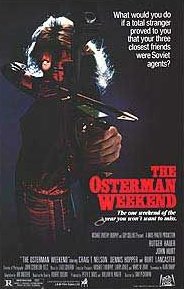I was laying bare that your statement about my responsibility (or failure) to meet them partway could easily be as interpreted as your inference that the only reason anyone liked it were suckers and conned by ďcritic proofing.Ē
It is a failure on your part not to meet Blair Witch part way, just like it is a failure on my part not to meet Babydriver part way. When you are a fan of a film, and you are not simply a passive fan and actually have ways to defend what the film is doing that aren't just horseshit, those who dismiss those merits have 'failed' the film. Now, just like you've probably settled on however you feel about BW, and I have certainly settled on how I feel about BD, we have both accepted our mutual failures, because these are films which are not designed to satisfy our particular aesthetic or thematic or whatever ideas of what makes art worthwhile.
I come from a point of view where I hold defiantly experimental and avant garde expression in very high regard. I like artists who make us question what art is, what beauty is, what narrative is, what form is. And I find an awful lot of conceptual underpinnings in BW that make it a great work of art in these respects, even if we want to accept what it got on camera was a fluke (which I don't, but that is beside the point).
So you are not a failure for not wanting to appreciate it under this very particular kind of lens. Most people don't. And I imagine even a lot of ardent fans of the film don't either. But what I am saying is that if you ever get to the point where these positions I have on art have any kind of serious value to you, I'm pointing to where you can find these values in Blair Witch.
Iíve tried to meet the film where I failed to connect emotionally to it and as Iíve said, I donít see a whole lot to value outside of that emotional reaction.
As I have repeatedly stated, you don't have to. It's a work that requires one to have an emotional reaction. And I get why it doesn't do that for you. But I feel you keep sniffing around the point that because others do have that emotional reaction, you are holding them suspect for it, because you didn't. Which is at the very least weird, and at worst, wildly solipsistic.
On a filmmaking level, itís comparable to Clerks. If you donít find Smithís film funny, thereís not much to like beyond the can do achievement of making a film for nothing. Itís a great accomplishment and interesting on a production front (which is where a lot of my appreciation for BW comes from) but it doesnít make Smithís shots any less point and shoot.
I'd say it is doing a lot more than what Clerks does. It's obviously not an artfully made film in any traditional sense, as the camera people (as far as I know) are not trained as camera people. They are simply documenting their experience. But the way in which the film is put together outside of how it was shot is where the film works its magic. A lot of people may have been given the exact same raw footage to work with, and they would not have gotten the results that the directors of BW did. Most people putting this footage together would have been left with a completely unwatchable mess that even I wouldn't be able to defend.
And even though I am no great fan of Kevin Smith, and his approach is very much 'point and shoot', I hesitate to say such an approach leaves a film without any value if we don't find it (in this case) funny. I believe that stripping a film away from all of its stylistic accoutrements, as Smith usually does, can leave an awful lot of things bare for an audience to consider in different ways. And while I don't find Clerks funny (I briefly did, but not anymore), it is the only film he made I think back on somewhat fondly. And it's not so much the laughs I once had with it, but more its eschewing of the pretense that we need to bring more camera skill to the table, if all a director wants is to document average, working class people talking. Relating to eachother in the most basic of ways. **** framing, and blocking and lighting, when all that is desired is this most basic of things. Communication. There is something even slightly revolutionary about Smiths lazy approach here.
That said, Kevin Smith still sucks the bag though.
 Check out my podcast:
Check out my podcast: 







